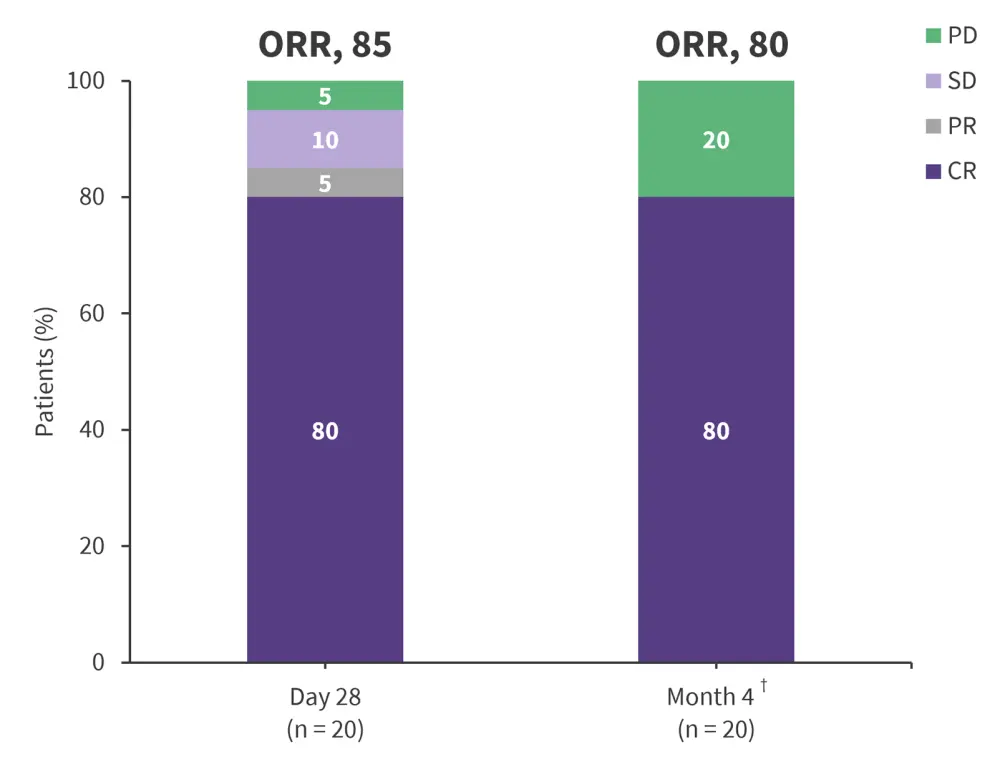All content on this site is intended for healthcare professionals only. By acknowledging this message and accessing the information on this website you are confirming that you are a Healthcare Professional. If you are a patient or carer, please visit the Lymphoma Coalition.
The lym Hub website uses a third-party service provided by Google that dynamically translates web content. Translations are machine generated, so may not be an exact or complete translation, and the lym Hub cannot guarantee the accuracy of translated content. The lym and its employees will not be liable for any direct, indirect, or consequential damages (even if foreseeable) resulting from use of the Google Translate feature. For further support with Google Translate, visit Google Translate Help.
The Lymphoma & CLL Hub is an independent medical education platform, sponsored by AbbVie, BeOne Medicines, Johnson & Johnson, Miltenyi Biomedicine, Nurix Therapeutics, Roche, Sobi, and Thermo Fisher Scientific and supported through educational grants from Bristol Myers Squibb, Lilly, and Pfizer. Funders are allowed no direct influence on our content. The levels of sponsorship listed are reflective of the amount of funding given. View funders.
Now you can support HCPs in making informed decisions for their patients
Your contribution helps us continuously deliver expertly curated content to HCPs worldwide. You will also have the opportunity to make a content suggestion for consideration and receive updates on the impact contributions are making to our content.
Find out more
Create an account and access these new features:
Bookmark content to read later
Select your specific areas of interest
View lymphoma & CLL content recommended for you
TARMAC trial: Time-limited ibrutinib plus CAR T-cell therapy for the treatment of R/R MCL
Patients with relapsed/refractory (R/R) mantle cell lymphoma (MCL) experience high response rates with CD19-directed chimeric antigen receptor (CAR) T cells; however, there is a risk of relapse and often considerable toxicity.
Here, we summarize the outcomes of the phase II TARMAC (NCT04234061) trial, published by Minson et al.1 in Blood, of the combination of time-limited ibrutinib and CTL019 CAR T-cells in patients with relapsed/refractory mantle cell lymphoma (MCL).
Study methods1
- This ongoing phase II study included patients with R/R MCL after ≥1 prior line of therapy.
- Ibrutinib was started at least 7 days before leukapheresis and continued through CAR T-cell production for at least 6 months after CAR T-cell administration.
- The primary endpoint was complete response (CR) rate at Month 4 after CAR T-cell infusion.
- Secondary endpoints included safety, overall response rate, measurable residual disease (MRD) negativity at Months 1, 4, 6, 9, and 12, progression-free survival (PFS), and overall survival; responses were also analyzed based on TP53 mutation status.
Key findings1
- Overall, 20 patients were included in the study:
- 75% were male;
- the median age was 66 years;
- The median time from study enrollment to CAR T-cell infusion and CAR T-cell manufacture was 60 days and 49 days, respectively; and
- 50% of patients had prior Bruton’s tyrosine kinase inhibitor (BTKi) exposure and 45% were BTKi refractory, with 15% receiving >1 BTKi.
- After infusion, the 4-month endpoint of CR rate was high, with a similar overall response rate, and an MRD-negativity rate of 70% (Figure 1).
Figure 1. Response to treatment*

CR, complete response; PD, progressive disease; PR, partial response; SD, stable disease.
*Adapted from Minson, et al.1
†14 patients were MRD negative by flow cytometry.
- At the median follow-up of 13 months, median PFS was not reached; however, the estimated 12-month PFS and overall survival were 75% and 100%, respectively.
- Deep and durable responses were seen in high-risk subgroups, including in patients with prior BTKi exposure or TP53 mutation.
- Deep responses were associated with robust CAR T-cell expansion and a less exhausted baseline T-cell phenotype.
- All patients reported an adverse event of any grade:
- 15 patients developed CRS (Grade 1–2, n = 12; Grade 3, n = 3).
Two patients developed reversible Grade 1–2 neurotoxicity.
| Key learnings |
|
References
Please indicate your level of agreement with the following statements:
The content was clear and easy to understand
The content addressed the learning objectives
The content was relevant to my practice
I will change my clinical practice as a result of this content

